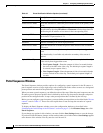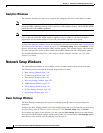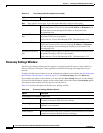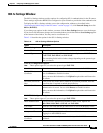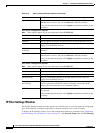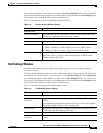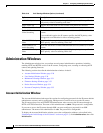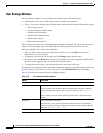
3-23
Cisco Video Surveillance 4300E and 4500E High-Definition IP Camera User Guide
OL-25230-02
Chapter 3 Configuring and Managing the IP Camera
Network Setup Windows
SNMP Settings Window
The SNMP Settings window provides options for configuring Simple Network Management Protocol
(SNMP) settings for the IP camera. These settings can help you manage complex networks by sending
messages to different devices on the network.
To display the SNMP window, access the configuration windows as described in the “Performing the
Initial Setup of the IP Camera” section on page 2-5, click Network Setup, then click SNMP.
If you change any options in this window, you must click the Save Settings button to save the changes.
If you do not click this button, changes are not retained when you exit the window. Save Settings appears
at the bottom of the window. You may need to scroll down to it.
Table 3-13 describes the options in the SNMP Settings window.
Ta b l e 3-13 SNMP Settings Window Options
Option Description
SNMP v2c Area
Enable SNMP v2c Check this check box to enable SNMP v2c.
Read Community String Enter the SNMP read community string, which identifies the valid read
community.
Trap Community String Enter the SNMP trap community string.
Primary Trap Receiver Identify the primary trap receiver of the SNMP v2c manager by choosing IP
Address or Hostname from the drop-down list and entering the IP address
or host name in the corresponding field.
Secondary Trap
Receiver
Identify an optional secondary trap receiver of the SNMP v2c manager by
choosing IP Address or Hostname from the drop-down list and entering the
IP address or host name in the corresponding field.
SNMP v3 Area
Enable SNMP v3 Check this check box to enable SNMP v3.
Use Default Local
Engine ID
Click this radio button if you want to use the default local engine ID for
SNMP.
The default local engine ID is 8000000903<MAC>, where <MAC> is the
MAC address of the IP camera.




